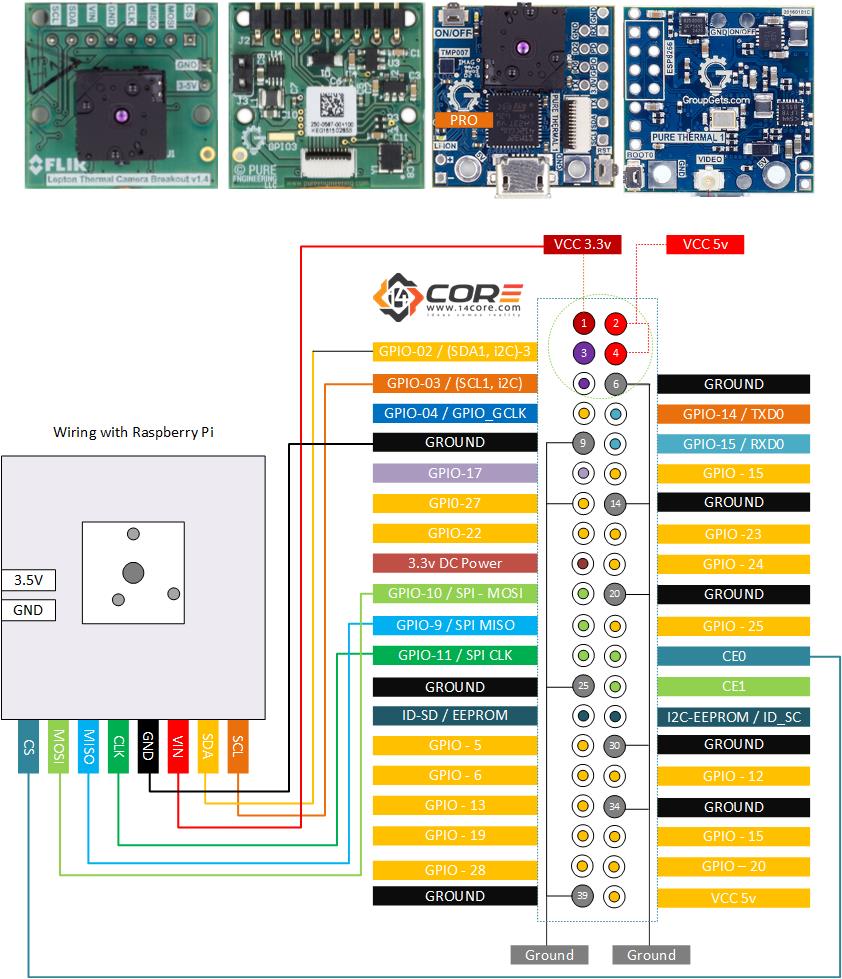#!/usr/bin/env python
import numpy as np
import ctypes
import struct
import time
# relative imports in Python3 must be explicit
from .ioctl_numbers import _IOR, _IOW
from fcntl import ioctl
SPI_IOC_MAGIC = ord("k")
SPI_IOC_RD_MODE = _IOR(SPI_IOC_MAGIC, 1, "=B")
SPI_IOC_WR_MODE = _IOW(SPI_IOC_MAGIC, 1, "=B")
SPI_IOC_RD_LSB_FIRST = _IOR(SPI_IOC_MAGIC, 2, "=B")
SPI_IOC_WR_LSB_FIRST = _IOW(SPI_IOC_MAGIC, 2, "=B")
SPI_IOC_RD_BITS_PER_WORD = _IOR(SPI_IOC_MAGIC, 3, "=B")
SPI_IOC_WR_BITS_PER_WORD = _IOW(SPI_IOC_MAGIC, 3, "=B")
SPI_IOC_RD_MAX_SPEED_HZ = _IOR(SPI_IOC_MAGIC, 4, "=I")
SPI_IOC_WR_MAX_SPEED_HZ = _IOW(SPI_IOC_MAGIC, 4, "=I")
SPI_CPHA = 0x01 # /* clock phase */
SPI_CPOL = 0x02 # /* clock polarity */
SPI_MODE_0 = (0|0) # /* (original MicroWire) */
SPI_MODE_1 = (0|SPI_CPHA)
SPI_MODE_2 = (SPI_CPOL|0)
SPI_MODE_3 = (SPI_CPOL|SPI_CPHA)
class Lepton(object):
"""Communication class for FLIR Lepton module on SPI
Args:
spi_dev (str): Location of SPI device node. Default '/dev/spidev0.0'.
"""
ROWS = 60
COLS = 80
VOSPI_FRAME_SIZE = COLS + 2
VOSPI_FRAME_SIZE_BYTES = VOSPI_FRAME_SIZE * 2
MODE = SPI_MODE_3
BITS = 8
SPEED = 18000000
SPIDEV_MESSAGE_LIMIT = 24
def __init__(self, spi_dev = "/dev/spidev0.0"):
self.__spi_dev = spi_dev
self.__txbuf = np.zeros(Lepton.VOSPI_FRAME_SIZE, dtype=np.uint16)
# struct spi_ioc_transfer {
# __u64 tx_buf;
# __u64 rx_buf;
# __u32 len;
# __u32 speed_hz;
# __u16 delay_usecs;
# __u8 bits_per_word;
# __u8 cs_change;
# __u32 pad;
# };
self.__xmit_struct = struct.Struct("=QQIIHBBI")
self.__msg_size = self.__xmit_struct.size
self.__xmit_buf = np.zeros((self.__msg_size * Lepton.ROWS), dtype=np.uint8)
self.__msg = _IOW(SPI_IOC_MAGIC, 0, self.__xmit_struct.format)
self.__capture_buf = np.zeros((Lepton.ROWS, Lepton.VOSPI_FRAME_SIZE, 1), dtype=np.uint16)
for i in range(Lepton.ROWS):
self.__xmit_struct.pack_into(self.__xmit_buf, i * self.__msg_size,
self.__txbuf.ctypes.data, # __u64 tx_buf;
self.__capture_buf.ctypes.data + Lepton.VOSPI_FRAME_SIZE_BYTES * i, # __u64 rx_buf;
Lepton.VOSPI_FRAME_SIZE_BYTES, # __u32 len;
Lepton.SPEED, # __u32 speed_hz;
0, # __u16 delay_usecs;
Lepton.BITS, # __u8 bits_per_word;
1, # __u8 cs_change;
0) # __u32 pad;
def __enter__(self):
# "In Python 3 the only way to open /dev/tty under Linux appears to be 1) in binary mode and 2) with buffering disabled."
self.__handle = open(self.__spi_dev, "wb+", buffering=0)
ioctl(self.__handle, SPI_IOC_RD_MODE, struct.pack("=B", Lepton.MODE))
ioctl(self.__handle, SPI_IOC_WR_MODE, struct.pack("=B", Lepton.MODE))
ioctl(self.__handle, SPI_IOC_RD_BITS_PER_WORD, struct.pack("=B", Lepton.BITS))
ioctl(self.__handle, SPI_IOC_WR_BITS_PER_WORD, struct.pack("=B", Lepton.BITS))
ioctl(self.__handle, SPI_IOC_RD_MAX_SPEED_HZ, struct.pack("=I", Lepton.SPEED))
ioctl(self.__handle, SPI_IOC_WR_MAX_SPEED_HZ, struct.pack("=I", Lepton.SPEED))
return self
def __exit__(self, type, value, tb):
self.__handle.close()
@staticmethod
def capture_segment(handle, xs_buf, xs_size, capture_buf):
messages = Lepton.ROWS
iow = _IOW(SPI_IOC_MAGIC, 0, xs_size)
ioctl(handle, iow, xs_buf, True)
while (capture_buf[0] & 0x000f) == 0x000f: # byteswapped 0x0f00
ioctl(handle, iow, xs_buf, True)
messages -= 1
# NB: the default spidev bufsiz is 4096 bytes so that's where the 24 message limit comes from: 4096 / Lepton.VOSPI_FRAME_SIZE_BYTES = 24.97...
# This 24 message limit works OK, but if you really need to optimize the read speed here, this hack is for you:
# The limit can be changed when spidev is loaded, but since it is compiled statically into newer raspbian kernels, that means
# modifying the kernel boot args to pass this option. This works too:
# $ sudo chmod 666 /sys/module/spidev/parameters/bufsiz
# $ echo 65536 > /sys/module/spidev/parameters/bufsiz
# Then Lepton.SPIDEV_MESSAGE_LIMIT of 24 can be raised to 59
while messages > 0:
if messages > Lepton.SPIDEV_MESSAGE_LIMIT:
count = Lepton.SPIDEV_MESSAGE_LIMIT
else:
count = messages
iow = _IOW(SPI_IOC_MAGIC, 0, xs_size * count)
ret = ioctl(handle, iow, xs_buf[xs_size * (60 - messages):], True)
if ret < 1:
raise IOError("can't send {0} spi messages ({1})".format(60, ret))
messages -= count
def capture(self, data_buffer = None, log_time = False, debug_print = False, retry_reset = True):
"""Capture a frame of data.
Captures 80x60 uint16 array of non-normalized (raw 12-bit) data. Returns that frame and a frame_id (which
is currently just the sum of all pixels). The Lepton will return multiple, identical frames at a rate of up
to ~27 Hz, with unique frames at only ~9 Hz, so the frame_id can help you from doing additional work
processing duplicate frames.
Args:
data_buffer (numpy.ndarray): Optional. If specified, should be ``(60,80,1)`` with `dtype`=``numpy.uint16``.
Returns:
tuple consisting of (data_buffer, frame_id)
"""
start = time.time()
if data_buffer is None:
data_buffer = np.ndarray((Lepton.ROWS, Lepton.COLS, 1), dtype=np.uint16)
elif data_buffer.ndim < 2 or data_buffer.shape[0] < Lepton.ROWS or data_buffer.shape[1] < Lepton.COLS or data_buffer.itemsize < 2:
raise Exception("Provided input array not large enough")
while True:
Lepton.capture_segment(self.__handle, self.__xmit_buf, self.__msg_size, self.__capture_buf[0])
if retry_reset and (self.__capture_buf[20, 0] & 0xFF0F) != 0x1400: # make sure that this is a well-formed frame, should find line 20 here
# Leave chip select deasserted for at least 185 ms to reset
if debug_print:
print("Garbage frame number reset waiting...")
time.sleep(0.185)
else:
break
self.__capture_buf.byteswap(True)
data_buffer[:,:] = self.__capture_buf[:,2:]
end = time.time()
if debug_print:
print("---")
for i in range(Lepton.ROWS):
fid = self.__capture_buf[i, 0, 0]
crc = self.__capture_buf[i, 1, 0]
fnum = fid & 0xFFF
print("0x{0:04x} 0x{1:04x} : Row {2:2} : crc={1}".format(fid, crc, fnum))
print("---")
if log_time:
print("frame processed int {0}s, {1}hz".format(end-start, 1.0/(end-start)))
# TODO: turn on telemetry to get real frame id, sum on this array is fast enough though (< 500us)
return data_buffer, data_buffer.sum()






